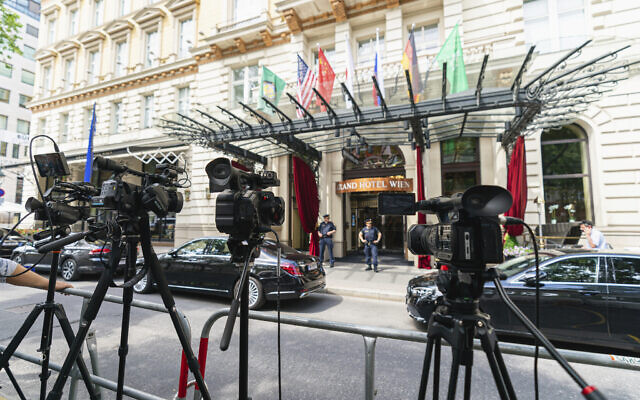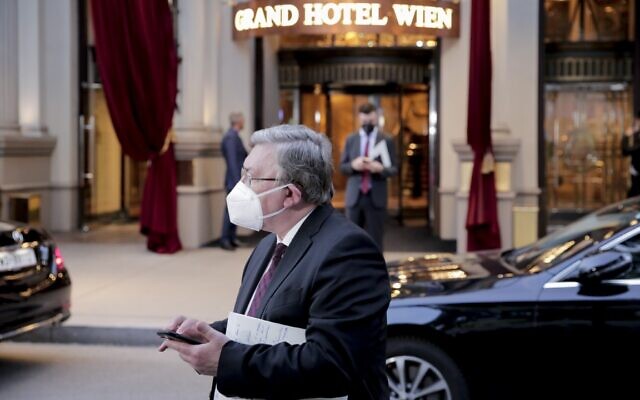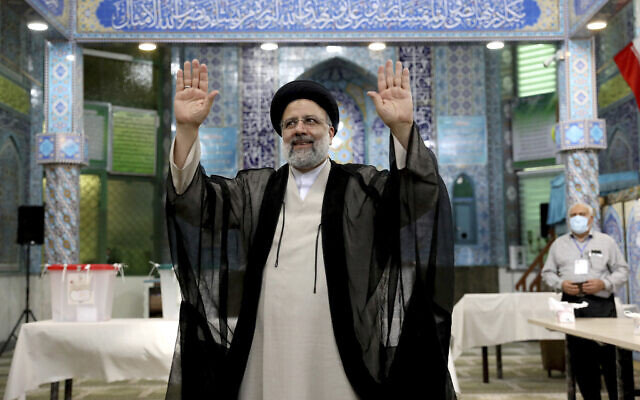US officials are increasingly pessimistic on the prospects of returning to the 2015 nuclear deal with Iran, The New York Times reported Saturday.
The US is indirectly involved in Iran’s talks with world powers to revive the deal that gave Iran some relief from international sanctions in exchange for limits on its nuclear program.
Officials expect the new government in Tehran, set to enter office on Thursday, to take a tougher approach that could doom chances of reaching an agreement.
“There’s a real risk here that they come back with unrealistic demands about what they can achieve in these talks,” Robert Malley, the top US negotiator, told the paper.
Another key issue of concern in Washington, the report said, is that after months of increased uranium enrichment to near-weapons grade levels, Iranian scientists are gaining crucial technical knowledge that will render the terms of the 2015 accord insufficient to curb Tehran’s nuclear ambitions.
“At that point, we will have to reassess the way forward,” Malley said. “We hope it doesn’t come to that.”
In addition, while Iran has been insisting that any US return to the deal be accompanied by a mechanism that will prevent it from quitting again, American officials believe it will be impossible, politically, to pass such a restriction through Congress, which is highly skeptical of the accord in the first place.
The ability to snap back sanctions on Iran if it fails to comply with aspects of the deal is crucial to keeping it palatable to US lawmakers, they said.

TV cameras in front of the ‘Grand Hotel Vienna’ where closed-door nuclear talks take place in Vienna, Austria, Sunday, June 20, 2021. (AP/Florian Schroetter)
On Thursday US Secretary of State Antony Blinken said nuclear talks with Iran “cannot go on indefinitely” but that Washington was “fully prepared” to continue negotiations.
The deal was torpedoed in 2018 by then US president Donald Trump, who unilaterally withdrew from the agreement and imposed punishing sanctions.
“We’re committed to diplomacy, but this process cannot go on indefinitely… we look to see what Iran is ready to do or not ready to do and remain fully prepared to return to Vienna to continue negotiations,” Blinken said during a visit to Kuwait. “The ball remains in Iran’s court.”
Iranian President Hassan Rouhani’s government had been holding talks with major powers in Vienna since April on bringing Washington back into the agreement. But talks have been frozen until he hands over to President-elect Ebrahim Raisi.
Raisi’s ultraconservative camp, which deeply distrusts the United States, has repeatedly criticized Rouhani over the 2015 deal.
Iran’s supreme leader Ayatollah Ali Khamenei said on Wednesday that experience has shown “trusting the West does not work,” referring to the US withdrawal from the deal and its fallout.
Raisi has said his government will support talks that “guarantee national interests,” but will not allow negotiations for the sake of negotiations.

File: Russia’s envoy to the International Atomic Energy Agency (IAEA), Mikhail Ulyanov, stands in front of the Grand Hotel Vienna where closed-door nuclear talks with Iran take place, in Vienna, Austria, Wednesday, June 2, 2021. (AP Photo/Lisa Leutner)
One of the major criticisms of the 2015 deal raised by Trump was its failure to address Iran’s ballistic missile program or its alleged interference in regional affairs.
But Tehran has always rejected bringing non-nuclear issues into the agreement, which is known formally as the Joint Comprehensive Plan of Action.
Khamenei also criticized the US for refusing to “guarantee that [it] will not violate the agreement in the future” by pulling out unilaterally, as Trump did in 2018.
Trump’s successor Joe Biden has signaled his readiness to return to the nuclear deal and has engaged in indirect negotiations with Iran alongside formal talks with the agreement’s remaining parties, Britain, China, France, Germany and Russia.
Israel’s Kan news reported Sunday that Jerusalem has warned US officials in recent days that Iran is closer than ever to attaining nuclear weapons.

Ebrahim Raisi, who went on to win Iran’s presidential election, waves after casting his vote at a polling station in Tehran, Iran, on June 18, 2021. (Ebrahim Noroozi/AP)
Foreign Minister Yair Lapid, Defense Minister Benny Gantz and other Israeli officials have addressed the issue with their American counterparts recently, issuing an “unusual warning,” according to the report.
“Something has to happen with the negotiations with Iran,” a senior diplomat told Kan. “This ‘limbo’ cannot be a time when Iran is quickly advancing toward becoming a nuclear threshold state.”
Israel has long opposed the nuclear deal and Biden’s stated intentions to reenter the treaty.
“We would like the world to understand that the Iranian regime is violent and fanatical,” Bennett said last month. “It selected the ‘Hangman of Tehran’ as its president — a man who is willing to starve his own people for years in order to have a military nuclear program. That is a regime that one should not do business with.”
Bennett added that Israel “will continue to consult with our friends, persuade, discuss, and share information and insights out of mutual respect. But at the end of the day, we will be responsible for our own fate, nobody else.”
Agencies contributed to this report.
World - Latest - Google News
August 01, 2021 at 08:08AM
https://ift.tt/2Wy2dcU
US said increasingly skeptical return to Iran nuclear deal is possible - The Times of Israel
World - Latest - Google News
https://ift.tt/2SeTG7d

No comments:
Post a Comment